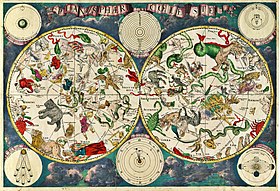
Back Natuurfilosofie AF فلسفة طبيعية Arabic Naturfəlsəfə AZ Натурфіласофія BE Натурфилософия Bulgarian প্রাকৃতিক দর্শন Bengali/Bangla Filosofia natural Catalan فەلسەفەی سروشتی CKB Přírodní filozofie Czech Naturfilosofi Danish

Natural philosophy or philosophy of nature (from Latin philosophia naturalis) is the philosophical study of physics, that is, nature and the physical universe while ignoring any supernatural influence. It was dominant before the development of modern science.
From the ancient world (at least since Aristotle) until the 19th century, natural philosophy was the common term for the study of physics (nature), a broad term that included botany, zoology, anthropology, and chemistry as well as what we now call physics. It was in the 19th century that the concept of science received its modern shape, with different subjects within science emerging, such as astronomy, biology, and physics. Institutions and communities devoted to science were founded.[1] Isaac Newton's book Philosophiæ Naturalis Principia Mathematica (1687) (English: Mathematical Principles of Natural Philosophy) reflects the use of the term natural philosophy in the 17th century. Even in the 19th century, the work that helped define much of modern physics bore the title Treatise on Natural Philosophy (1867).
In the German tradition, Naturphilosophie (philosophy of nature) persisted into the 18th and 19th centuries as an attempt to achieve a speculative unity of nature and spirit, after rejecting the scholastic tradition and replacing Aristotelian metaphysics, along with those of the dogmatic churchmen, with Kantian rationalism. Some of the greatest names in German philosophy are associated with this movement, including Goethe, Hegel, and Schelling. Naturphilosophie was associated with Romanticism and a view that regarded the natural world as a kind of giant organism, as opposed to the philosophical approach of figures such as John Locke and others espousing a more mechanical philosophy of the world, regarding it as being like a machine.[citation needed]
- ^ Cahan, David, ed. (2003). From Natural Philosophy to the Sciences: Writing the History of Nineteenth-Century Science. Chicago: University of Chicago Press. ISBN 0226089282.